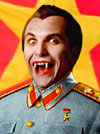|
MENU
Home
Books
Horror Film Aesthetics
Horror Film Festivals and Awards
Vampire
Nation
Pentagon Possessed
Cost of Freedom
Manhattan
Sharks
Halloween
Candy
Hollywood
Witches
Short Works
Pursuits
Actor
Film Festival Director
Editorial Services
Media
Appearances
Horror Film Reviews
Blogs
Horror Film Aesthetics
Communist Vampires
Horror Film Festivals and Awards
Other
Business
Satire
Nicolae Ceausescu
Commuist Vampires
Stalinist Zombies
L'Internationale Song
Links

|
Teeth by Edo Van Belkom (Meisha Merlin, 2001, 255 pp.)
 Edo
Van Belkom has a flare for absurdist black comedy, demonstrated in
short stories such as "The Rug" and "Bum Rap." He'd read "Bum Rap"
to laughter and applause at the 2001 World Horror Convention. The
applause was partially for his frenzied delivery, partially for
"Bum Rap"'s hilariously over-the-top premise: a woman who sucks
men up her anus, then excretes them in a messy explosion. Edo
Van Belkom has a flare for absurdist black comedy, demonstrated in
short stories such as "The Rug" and "Bum Rap." He'd read "Bum Rap"
to laughter and applause at the 2001 World Horror Convention. The
applause was partially for his frenzied delivery, partially for
"Bum Rap"'s hilariously over-the-top premise: a woman who sucks
men up her anus, then excretes them in a messy explosion.
Yes, it's an envelop-pusher.
Teeth's premise seems right up Van Belkom's alley. A woman
serial killer with vaginal teeth. She copulates, then castrates
and kills her victims. The term "castrate" is used throughout the
boo, even when it's only the penis that's severed.
Academics have long recognized the castration symbolism in much of
horror (e.g. the tentacled sucking monsters in 1950s horror/sci-fi
films).
Teeth's contribution is to remove all symbolism and present
this primal fear unadulterated.
Regrettably,
Teeth is a surprisingly drab book, with less sex and gore
than its premise suggests, flatly written and without humor. In
lieu of humor, Van Belkom substitutes "sympathetic" cardboard
characters and "important statements." Instead of over-the-top
black comedy,
Teeth reads like a humorless feminist tract.
Yes,
Teeth's front matter includes the usual blurbs of effusive
praise, but the reviewer from Publishers Weekly confirms
every fault I found in
Teeth, so my assessment can't be completely out of line.
Teeth centers on Van Belkom's sad sack hero, an average Joe
called ... Joe. Joe is a forty-something Canadian police detective
assigned to find the vaginal killer.
Teeth has been called "part police procedural" and I guess the
investigation scenes are acceptable. But forget the investigation
-- Joe has other matters on his mind. Personal issues he grapples
with throughout his investigation. His beloved wife is dead. He
frets that his daughter, Melissa, won't attend college; she wants
to backpack across Europe and work on a kibbutz.
Fortunately, Joe is an Oprah kind of guy. He is surrounded by wise
women, and he is wise enough to listen. Joe learns that his late
wife supported Melissa's independent-mindedness, as Melissa knows
what's best for herself.
Joe comes to understand the barriers of
his previous uncommunicativeness, and that he must learn to open
up and share. Melissa educates Joe about the hole in the ozone,
and Joe is wise not to use his car air conditioner. Joe learns
that a secretary who looks like a ditsy bimbo is really smarter
and stronger than she appears (its her outwardly respectable male
CEO boss who turns out to be the sleazy fool). And a world-weary
waitress (who attends night school, much to Joe's admiration)
recounts the sad story of her failed marriage to the creep who ran
out on her.
There sure are lots of male creeps out there, which is one of the
many life lessons Joe comes to appreciate.
Teeth is less about a vaginal serial killer than about Joe's
journey of discovery, his consciousness-raising about the lying
sleaziness of men, and the women who survive them.
Publishers Weekly correctly states:
"Flat writing and
characterization on top of crudely exaggerated male and female
sexual polarities don't win van Belkom any prizes for style
or subtlety."

Van Belkom might protest that in expanding his short story (which
Teeth originally was), it was necessary to "flesh out" his
tale with related themes. That a short story's "have sex and die"
formula makes for a poor novel. True enough. But instead of
seamlessly weaving his themes into the fabric of the novel, Van
Belkom has clumsily grafted them on in a manner that violates the
fundamental rule of "show, don't tell."
The high-school-age Melissa lectures to Joe: "Is it so much to ask
a woman to wait for a man who joins the navy? To wait for a man
who goes to an American school on a scholarship? Who takes a job
in a foreign country? I don't think there's anything wrong with
the man waiting for the woman, except the fact that some people
can't accept that gender roles are being reversed more often these
days."
It's not that there's anything inherently wrong with Melissa's
points. On the contrary, Van Belkom belabors the obvious (if he
hopes to be daring, he's 30 years too late).
Teeth is annoying
less for its stance (though I disagree with its ozone hole theory)
than with its sledgehammer approach. The male victims are not
merely sexist, they are sexist caricatures. Worse, they are
unfunny caricatures. The Yang side of what Publishers Weekly
called
Teeth's "crudely exaggerated male and female sexual
polarities."
Van Belkom must have sensed that flaw, because he makes a weak
attempt to compensate: through more telling, not showing. Seeking
to profile his killer, Joe consults Ellen "the Sex Lady" Grant, a
fiftysomething radio psychobabbler who lectures a caller about the
good men who work in women's shelters and rape crisis centers
(thereby simultaneously reminding us of the evil that men
do).
Lectures can be appropriate, as when characters reveal facts
unknown to most readers. And dialogue inappropriate in a dramatic
novel may be appropriate in satire. But
Teeth eschews satire. A
big mistake, because a funny book would have carried its message
to a wider audience. Instead, Teeth's humorless assertions limit
its appeal to those in search of a tract. Perhaps an editor
convinced Van Belkom to expand his gory little story into
something "important." In any event,
Teeth fails as a novel.
As Publishers Weekly said: "The best part of this lurid horror novel from Canadian van Belkom
is the prologue, originally a short story ... In extending this
idea to novel length the author betrays its limits."

I think the premise had potential as a novel, but Publisher's
Weekly is correct in that Van Belkom fails to realize it. Aside
from the telegraphed messages, his one-dimensional characters make
for predictable events, destroying all suspense.
At one point, Melissa brings home a Mr. Perfect (as defined by
what feminists call "the traditionalist patriarchy"). He's a law
student, well on his way to yuppie success. The oafish Joe is
thrilled. But the wiser Melissa has reservations.
From the moment Mr. Perfect was introduced, I knew -- I just knew!
-- he was scum. Suit and tie. Respectful to Joe. Career-oriented.
A Shining Knight in Armor. A true Prince. You don't find those in
feminist tracts. And sure enough, this exemplar of patriarchal
perfection rapes Melissa. And to underline just how scummy he is,
he insists "she wanted it." He's not a character; he's a
caricature.
As Publishers Weekly said: "A subplot involving the fate of Williams's overly independent
daughter doesn't stray from its predictable path."
Teeth is
so predictable, I also guessed (early on) that the
vaginal killer would go free. Her male victims are so obnoxious
that even the non-rapists among them "deserve" to die. Consensual
sex is no excuse for being a man.
But even that might have been acceptable -- if
Teeth were funny.
Obnoxiousness is enough to merit death in
Tales From the Crypt,
because the Cryptkeeper has a wry sense of dark humor. We don't
take him seriously, so we suspend judgment. We accept that his
"characters" are really satirical caricatures of greed, lust,
sexism, infidelity, or other vices.
But
Teeth is humorless.

Another saving grace would have been an interesting villain. Great
horror features great villains. But despite her vaginal teeth,
Teeth's serial killer is remarkably prosaic. A thinly sketched
nothing.
Van Belkom might counter that he reveals little about the killer
so that her eventual revelation would be a surprise. That might be
appropriate for a mystery, less so for horror. But even as a
mystery,
Teeth is boring. In any event, the effect is to lessen
our interest in her, and decrease tension.
As Publishers Weekly said: "[T]he delayed revelation of the remarkably equipped killer's
identity is embarrassingly unconvincing."
Teeth also suffers sloppy editing, resulting in contradictory
elements. For instance, Joe examines leather S&M gear in Ray
Markham's (the first victim) apartment. Joe thinks: "What kind of
man had made use of the place from time to time. An asshole, Joe
concluded. A fucking creep. How else could you describe a guy who
could pose with kids in wheelchairs over at the hospital and then
drive across town and chain women to his bed so he could beat them
with leather?"
But how does Joe deduce that Markham would "chain women
to his bed so he could beat them with leather?" The evidence
contradicts deduction. Ray's corpse is found tied to a bed,
indicating he was a masochist -- not a sadist.
Of course,
Joe knows that Ray was a sadist because Van Belkom knows it. And
Van Belkom planted the knowledge into Joe's head, despite planting
contradictory evidence in the scene.
Oops!

I reviewed an "advance uncorrected proof" so it's possible this
error was corrected in the final copy. But unlikely, be cause this
is not a typo, but an editorial error.
Considering all the blurbs of praise from other authors (who
supposedly read
Teeth), it's remarkable no one caught this error.
I share the perplexity of Publishers Weekly, which states:
"This book will titillate young readers eager for sensation and
will repel their elders, who should know better but may not. After
all, several horror notables ... supply ringing endorsements."
One horror author blurbs
Teeth as "over-the-top sexual horror,"
but really,
Teeth is less daring than Clive Barker's
Books of Blood, written some
20 years earlier. Lacking Van Belkom's usual dark wit,
Teeth's sex
and gore never rise above prosaic splatterpunk. What could have
been gonzo over-the-top satire, is instead a dreary Oprah-fied
domestic drama.
"Bum Rap" has potential. If Van Belkom expands it into a novel,
one hopes he'll forego "seriousness" and concentrate on its
inherent twisted humor.

|







 Edo
Van Belkom has a flare for absurdist black comedy, demonstrated in
short stories such as "The Rug" and "Bum Rap." He'd read "Bum Rap"
to laughter and applause at the 2001 World Horror Convention. The
applause was partially for his frenzied delivery, partially for
"Bum Rap"'s hilariously over-the-top premise: a woman who sucks
men up her anus, then excretes them in a messy explosion.
Edo
Van Belkom has a flare for absurdist black comedy, demonstrated in
short stories such as "The Rug" and "Bum Rap." He'd read "Bum Rap"
to laughter and applause at the 2001 World Horror Convention. The
applause was partially for his frenzied delivery, partially for
"Bum Rap"'s hilariously over-the-top premise: a woman who sucks
men up her anus, then excretes them in a messy explosion.